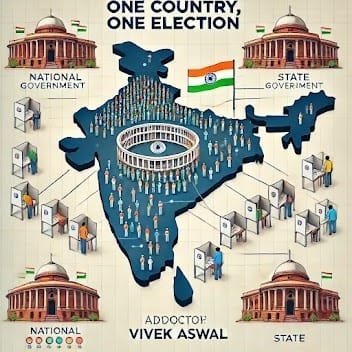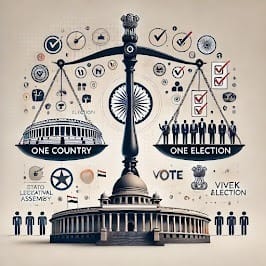How Many Elections Have Been Held in India Based on One Nation, One Election.
Introduction
The One Nation, One Election concept has sparked considerable debate in India’s political landscape. With the approval of the Cabinet on the recommendations of the former President of India Ram Nath Kovind Committee, the debate on one nation, one election has once again become a topic of discussion. From political corridors to the general public, discussions have started on a large scale as to what exactly is one nation, one election and what is its history in India. Today there is a heated discussion in India on whether one Country one election should be implemented or not but no one discusses the topic why India got away from this system, today’s blog post discusses the topic of whether there was one Country one election in India or one nation one election system in India and if it was there then how many polls were conducted till now and what is being done due to which one nation one election system had to be abandoned and why the country got away from it. Today’s post can help you a lot in understanding this debate in the external environment and invites your thoughts.

1957: In the second general election, Lok Sabha and State Assembly elections were again held together.
1967: During the fourth general election, the Lok Sabha and many State Assembly elections were held together.
Early History of one nation one election: Simultaneous Elections in India
In these early years, elections were conducted together to ensure smoother governance and reduce costs. The idea was simple: since the governments at both the state and national levels were elected for a five-year term, their elections should happen simultaneously, making the process more efficient.
In India, the Lok Sabha and State Assembly elections were held together several times, especially in the early decades.
Below are the major elections when Lok Sabha and State Assembly elections were held simultaneously.
1951-52: This was India’s first general election, where both the Lok Sabha and most state assemblies’ elections were held together.
1962: The third general election also saw simultaneous elections for the Lok Sabha and State Assemblies.
However, after 1967, due to political instability and government collapses in several states, assemblies were dissolved prematurely. This caused elections in different states to be held separately from Lok Sabha elections. Since then, the elections for the Lok Sabha and state assemblies have mostly occurred at different times.
Why Did India Move Away fromc Simultaneous Elections?
In the early days in India, elections to Lok Sabha and state assemblies were held simultaneously; despite considerable success, there were many incidents due to which this process started to fail and it became impossible to keep it under control.
Let us know about some important reasons.
1. Premature Dissolution of State Assemblies: Some state assemblies were dissolved prematurely, leading to unsynchronized elections in certain states. For example, in 1968 and 1969, political instability caused the governments in several states to fall, which led to elections being held earlier than their scheduled term.
2. Dissolution of the Lok Sabha: In 1971, the Lok Sabha was also dissolved before the completion of its five-year term, leading to early general elections. This further disrupted the synchronization between national and state elections.
3. Fragmented Election Cycles: After the dissolution of both state assemblies and the Lok Sabha at different times, it became challenging to bring the elections back in sync. Over the years, different states had elections at various times, and the staggered election cycle became the norm.
As a result, the country moved away from the One Nation, One Election model, and elections began to be held separately for the Lok Sabha and different state assemblies. By the late 1970s and beyond, elections were being conducted throughout the year in different states, depending on their political circumstances.
Current Scenario: Why Is One Nation, One Election Being Discussed Again?
Today, the idea of returning to One Nation, One Election is once again
gaining momentum. The Indian government has been actively pushing for this concept, arguing that simultaneous elections would bring several benefits:
In today’s time, when the report of former President Ram Nath Kovind has been approved by the Cabinet, the issue has again started whether the One Nation One Election is a corrective step to improve the future of India or what will be its benefits. While the ruling party BJP or its supporters welcome it, the opposition calls it a way to divert attention from the current issues of the country or to gain political benefits. Let us know what the possible benefits could be.

- Cost Efficiency: Holding elections simultaneously would reduce the financial burden on the Election Commission and the government. Elections are expensive in India, and the resources spent on separate elections could be minimized through synchronization.
- Smoother Governance: With the current system of staggered elections, the Model Code of Conduct is frequently enforced, which restricts the government’s ability to announce new policies. A synchronized election would allow governments at both the national
and state levels to focus on governance without constant interruptions for elections. - Voter Fatigue: Frequent elections lead to voter fatigue, where citizens become disengaged due to the constant election cycles. A single election for both national and state governments could encourage more consistent voter participation.
- Unified Campaigning: National and regional issues could be addressed simultaneously, allowing political parties to present a clear vision for both the state and the country as a whole.
All the benefits mentioned above are in the public interest, due to which it can also be said that elections being held regularly in the country affects the progress of the country. Due to elections being held regularly in the country, preparations for the elections keep going on and the leaders of the ruling party or the opposition are seen the most in campaigning. Contribute to the national interest by sharing your views.
Challenges to Implementing One Nation, One Election Today
While there are many arguments in favor of returning to simultaneous elections, several challenges remain:
In the political developments of India, where the BJP is seen presenting its stand and argument on the issue of one country and one election, the Congress which is out of power is seen opposing it. The main reason for this could be that Congress has seen this change but can the present situation help in achieving it again or is it not possible? Let us know about the challenges that are visible at present.
- Logistical Issues: Conducting elections in a country as large and diverse as India poses significant logistical challenges. Holding national and state elections together would require massive coordination across all states, involving security, polling personnel, and election materials.
- Constitutional Amendments: To implement *One Nation, One Election*, the Constitution would need to be amended. The terms of state assemblies and the Lok Sabha would have to be aligned, which could prove difficult, especially if state governments are
reluctant to shorten or extend their current terms. - Political Resistance: Regional parties have expressed concerns that simultaneous elections could lead to their issues being overshadowed by national concerns. Smaller parties fear that their voice might be lost if national elections dominate the conversation.
- Handling Mid-Term Dissolutions: One of the biggest challenges is figuring out how to handle situations where a state assembly or the Lok Sabha is dissolved mid-term. Would by-elections be held only for that state, or would the entire system need to be realigned?

Conclusion
After looking at the pros and cons of the concept of one nation one election, it must be said that the history of India has been supporting one nation one election and has also achieved success from 1952 to 1967, but due to political instability and party problems, India had to
abandon this system and move towards phased elections which is continuing till date.
The debate continues, and whether India will see a return to simultaneous elections remains an open question. In which all of you Indians have an important role. Do not stop the arguments for or against, this is a blog post, write your thoughts, comment and share the post.
FAQs on One Nation, One Election in India
What is One Nation, One Election?
One Nation, One Election is the concept of conducting elections for both the Lok Sabha and state legislative assemblies simultaneously across India, instead of the current system of staggered elections.
How many elections were held under the One Nation, One Election system in India?
India conducted four elections under this system: in 1952, 1957, 1962, and 1967. After 1967, the cycle was disrupted due to the premature dissolution of state assemblies and the Lok Sabha.
Why did India stop holding simultaneous elections?
The practice was disrupted due to political instability in the late 1960s. Several state assemblies were dissolved early, leading to elections being held at different times. The dissolution of the Lok Sabha in 1971 further complicated synchronization.
What are the benefits of One Nation, One Election?
Simultaneous elections could save costs, reduce voter fatigue, minimize disruptions caused by the frequent implementation of the Model Code of Conduct, and allow governments to focus on governance for a full term without election interruptions.
What are the challenges of implementing One Nation, One Election today?
Significant challenges include logistical issues in conducting nationwide elections, the need for constitutional amendments to align terms of state assemblies and the Lok Sabha, political resistance from regional parties, and handling mid-term dissolutions of governments.

Isse desh ko fayda hai neta ko nuksaan hai Lagu hona chahiye